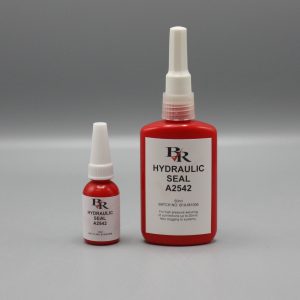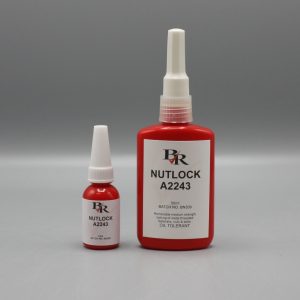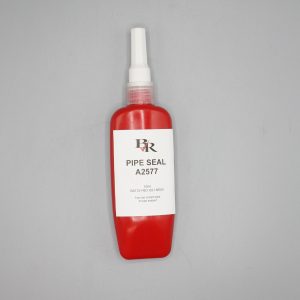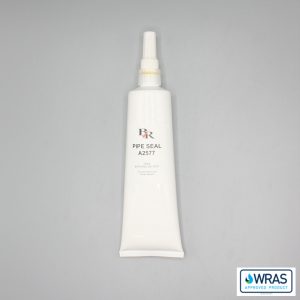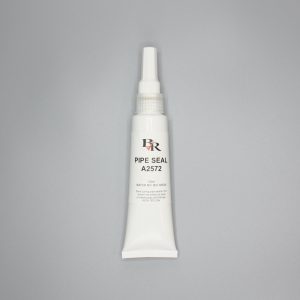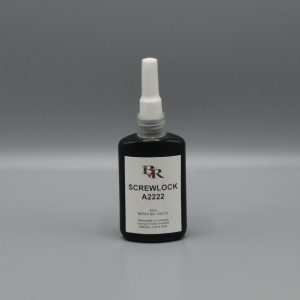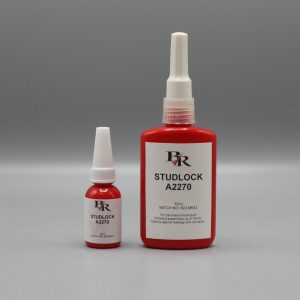Threadlocker Adhesive & Screw Thread Locking Glues
Bondrite’s Threadlocker Adhesive & Screw Thread Locking Glues are high quality glues designed to prevent fastener loosening for a range of applications – including those where disassembly is also required. We stock oil tolerant Nutlock for use in gearboxes and engines, heavy duty Stud Lock for use in pump housings, Screwlock for securing screws that still need to be disassembled, Hydraulic seal for sealing of large studs and bolts, Pipe Seal with PTFE for hydraulic and pneumatic systems and High Strength Retainer for radiator assemblies.
Whatever your application we have a lock or seal designed for you.
Showing all 8 results
-
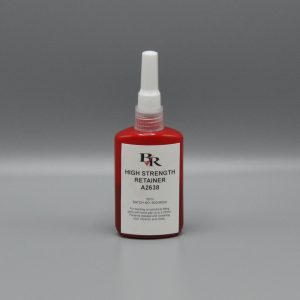
High Strength Retainer 50ml – A2638
£24.24 Add to basket -

Hydraulic Seal Adhesive A2542
From: £7.32 Select options This product has multiple variants. The options may be chosen on the product page -

Nutlock Thread-locking Adhesive A2243
From: £7.32 Select options This product has multiple variants. The options may be chosen on the product page -

Pipe Seal Adhesive – 50ml – A2577
£24.24 Add to basket -

Pipe Seal Adhesive with Approvals – 250ml – A2577
£86.98 Add to basket -

Pipe Seal with PTFE – 50ml – A2572
£24.24 Add to basket -

Screw Lock Adhesive Glue A2222 50ml
£24.24 Add to basket -

Studlock Adhesive A2270
From: £7.32 Select options This product has multiple variants. The options may be chosen on the product page
Anaerobic thread sealing and locking adhesives explored
This liquid adhesive cures in the absence of air, at room temperature, and upon contact with metal. They effectively fill the gaps between mating threads, ensuring that threads and joints are securely locked.
On top of that, thread lockers are used to prevent the loosening or unintended disassembly of threaded connections. They work by counteracting the effects of vibration, thermal expansion, or other external forces that could otherwise cause the threads to come apart.
Furthermore, they have been proven to be tolerant of minor contamination from industrial oils, such as engine oils, corrosion prevention oils, and cutting fluids as well, and depending on the one you buy can also have a good working temperature range from -55°C to 150°C.
Thread Lock Adhesive is also available in different strengths to suit various applications, and thread sizes, and they can maintain critical clamp load pressures even in the harshest environments as well.
So let’s explore this range of thread sealants and adhesives that are suitable for threaded assemblies in more detail.
Thread locking strength
- A2222 – purple – low strength for easy disassembly
- A2243 – blue – medium strength for disassembly with hand tools
- A2270 – green – high strength to prevent leakage and loosening by vibration
- A2542 – brown – medium strength with chemical resistance
- A2572 – white – medium strength for an instant, low-pressure seal
- A2577 – yellow – threadlocker – medium strength for a 10,000psi seal
- A2638 – green – ultra high strength adhesive for cyclic load stress
Studlock Adhesive – A2270 – Equivalent to brand product 270 – Green.
Our Studlock Adhesive is a Threadlocker that is used more for general purpose sealing of threaded connections against oil, and leaded petrol, ethanol, acetone, brake fluid and most common materials conveyed by pipes.
This Studlock adhesive is designed for the sealing and locking of threaded fasteners, including heavy-duty applications, such as nuts, onto studs in pump housings and studs into motor housings. It is also used on other fasteners where maximum strength is required.
This high strength threadlocker can resist higher levels of vibrations but may still be disassembled using heat and power tools.
Available in the following sizes:
- 10ml Studlock Adhesive – A2270
- 50ml Studlock Adhesive – A2270
High Strength Retainer Adhesive – A2638 – Equivalent to brand product 638 – Green.
Our Strength Retainer Adhesive is used for bonding: cylindrical fitting parts, particularly where the bond gap can approach 0.25mm, Locating pins in the radiator, Assemblies, Bearings in transmissions and Sleeves into pump housings.
This permanent retainer cures when confined in the absence of air between close fitting metal with an ultimate structural strength. The product is designed for the permanent fixture of parts and not recommended for parts that may require a strip down or maintenance related dis-assembly.
Available in the following size:
- High Strength Retainer – 50ml – A2638
Hydraulic Seal Adhesive – A2542 – Equivalent to brand product 542 – Brown.
This medium strength threadlocker is designed for the sealing and locking of metal threaded fasteners. The product is a single component anaerobic, medium strength thixotropic threadlocker.
The product cures when confined in the absence of air between close fitting metal surfaces. This hydraulic seal threadlocker adhesive has a unique balance of mechanical strength with chemical resistance making it particularly suited to hydraulic applications and assemblies.
Available in the following sizes:
- 10ml Hydraulic Seal Adhesive – A2542
- 50ml Hydraulic Seal Adhesive – A2542
Nutlock Thread-locking Adhesive – A2243 – Equivalent to brand product 243 – Blue.
Our Blue Threadlocker Adhesive, is used for threaded fasteners, and to lock nuts, which may require normal disassembly with standard hand tools, Gearbox bolts / driveshafts, Bearing cover cap screws, Counter sunk screws, Conveyor roller bolts, Construction equipment, and similar materials.
Nutlock Thread locking Adhesive – A2243 protects threads from rust and corrosion and prevents loosening from shock and vibration, replacing lock washers and plastic inserts. It locks machine tool access bolts, studs and hydraulic system bolts.
Available in the following sizes:
- 10ml Nutlock Thread-locking Adhesive – A2243
- 50ml Nutlock Thread-locking Adhesive – A2243
Pipe Seal Adhesive with Approvals – A2577 – Equivalent to brand product 577 – Yellow.
Our Seal Adhesive with Approvals, is used in sealing threaded connections against: Water, Oil, Gases, and most common materials conveyed by pipes.
Pipe seal A2577 is used in the sealing of all types of threaded connections against water, oil, gases and most common materials conveyed by metal pipes. It is used on most hydraulic, pneumatic, oil, water and gas connections. This is a medium strength threadlocker and pipe sealant which provides a non-shrink, instant, low-pressure seal on tightened fittings.
This pipe sealant has gas (BSEN751/DVGW) and water (WRAS) approvals for use on pipe fittings and course threaded components.
Available in the following size:
- 50ml Pipe Seal Adhesive with Approvals – A2577
Pipe Seal with PTFE – A2572 – Equivalent to brand product 572 – White.
Pipe Seal with PTFE A2572 is a medium strength, high viscosity anaerobic sealant, or gasket maker. It provides an instant low pressure seal on assembly of the mating flange faces. This gasket maker is thixotropic, which reduces the migration of the liquid adhesive following application onto the component surface. This grade is designed to offer a controlled low break strength, which allows easy component disassembly.
The Pipe seal A2572 is designed for the locking and sealing of metal pipes and fittings. It is used on most hydraulic, pneumatic, oil, water and gas connections. This grade contains PTFE (Polytetrafluoroethylne), which lubricates the parts during assembly, providing additional maintenance support. This sealant can be used with or without pre-cut, pre-formed gaskets.
Available in the following size:
- 50ml Pipe Seal with PTFE – A2572
Screwlock – A2222 – Equivalent to brand product 222 – Purple.
Our Screwlock adhesive, is used in the: Adjustment of set screws, Small diameter or long length fasteners where easy disassembly is required without shearing the screw, Sealing and locking of threaded fasteners.
Screwlock A2222 is designed for the sealing and locking of threaded fasteners, which may require easy disassembly with standard hand tools, and can replace nylon patches, star washers, and spring washers on screws and other threaded fittings where easy dismantling is required. They provide a reliable solution for maintaining the integrity of threaded connections while allowing for convenient disassembly when needed.
This adhesive is a single-component, anaerobic, low-strength, thixotropic, acrylic-based thread locker, and it cures when confined in the absence of air between close-fitting metal surfaces while preventing leakage and loosening from vibration and shock.
Available in the following size:
- 50ml Screwlock – A2222
Anaerobic adhesives, also known as thread-locking adhesives, are specialised adhesives that cure in the absence of air / Oxygen. These glues are used primarily in the manufacturing and maintenance of mechanical assemblies to securely fasten components together. Thread locking adhesives have become increasingly popular due to their ability to improve the overall strength and reliability of a joint, as well as prevent loosening caused by vibration or other external forces.
How do Anaerobic adhesives work?
Anaerobic adhesives work by filling the gaps between mating surfaces and curing in the absence of air. This creates a strong bond that prevents movement and keeps the components firmly locked together. The adhesive is typically applied to threaded fasteners, such as bolts and screws, but can also be used on other types of mechanical assemblies.
Can Anaerobic adhesives be used in wet environments?
Yes, some formulations of Anaerobic adhesives are designed for use in wet environments, such as those found in the marine industry.
Can Anaerobic adhesives be used on painted surfaces?
It’s generally not recommended to use Anaerobic adhesives on painted surfaces, as the adhesive may not bond properly to the paint. It’s best to apply the adhesive directly to the bare metal surface.
Can Anaerobic adhesives be used on plastic surfaces?
Yes, there are some formulations of Anaerobic adhesives that are specifically designed for use on plastic surfaces. However, it’s important to check the recommendations to ensure that the adhesive is compatible with the specific type of plastic.
Can Anaerobic adhesives be used for gap filling?
No, Anaerobic adhesives are not designed for gap-filling. They require close-fitting surfaces to create a strong bond.
Can Anaerobic adhesives be used on Aluminium surfaces?
Yes, certain Anaerobic adhesives have been designed for use on Aluminium surfaces; however, it’s important to check the recommendations to ensure that the adhesive is compatible with the specific type of Aluminium.
Can Anaerobic adhesives be used on stainless steel surfaces?
Yes, Anaerobic adhesives can be used on stainless steel surfaces. However, it’s important to choose a formulation that is specifically designed for use on stainless steel to ensure a strong bond.
Thread locking Approvals
We also stock our non-hazardous Pipe Seal Adhesive with Approvals. These approvals consist of:
- WRAS
- BSEN751
- DVGW
- ROHS
Threadlocker Curing
As a liquid threadlocker cures, it forms polymer chains that penetrate every tiny imperfection in the threads giving you a secure bond on locks bolts and nuts as a result.
Benefits of Anaerobic adhesives
There are several benefits to using Anaerobic adhesives in mechanical assemblies, including:
Improved strength
Threadlocking adhesive creates a strong bond that prevents loosening caused by vibration or other external forces. This improves the overall strength and reliability of the joint.
Corrosion resistance
Anaerobic adhesives are resistant to corrosion, which is a common problem in metal-to-metal joints. This helps to extend the life of the joint and prevent costly repairs.
Reduced assembly time
Threadlocker adhesive cures quickly, which reduces assembly time and allows for faster production.
Easy disassembly
While thread-locking adhesives create a strong bond, they are also designed to be easily disassembled when necessary. This allows for repairs and maintenance to be performed without damaging the components.
Application uses for Anaerobic adhesives
Thread locking adhesives have a wide range of applications in the manufacturing and maintenance of mechanical assemblies. Some common applications include:
Automotive
Thread locking adhesives are used in the assembly of engines, transmissions, and other critical components in vehicles.
Aerospace
Thread locking adhesives are used in the assembly of aircraft engines, landing gear, and other critical components in the aerospace industry.
Industrial machinery
Thread locking adhesives are used in the assembly of heavy machinery, such as pumps, motors, and gearboxes.
Construction
Thread locking adhesives are used in the construction of bridges, buildings, and other infrastructure projects.
What types of surfaces can Anaerobic adhesives be used on?
Anaerobic adhesives are typically used on metal surfaces, although some formulations can also be used on plastics and other materials.
How long does it take for Anaerobic adhesives to cure?
The cure time for Anaerobic adhesives can vary depending on the formulation, but it typically ranges from a few minutes to several hours.
Can Anaerobic adhesives be used in high-temperature applications?
Yes, there are Anaerobic adhesives that are specifically designed for high temperature resistance applications, such as those found in the automotive and aerospace industries.
Are there any safety precautions I should take when using Anaerobic adhesives?
Yes, it’s important to follow the safety guidelines when using Anaerobic adhesives, including wearing gloves and protective eyewear and ensuring adequate ventilation in the workspace.
How do I remove Anaerobic adhesives?
Anaerobic adhesives can be removed using heat or solvents that are specifically designed for that purpose. It’s important to follow the instructions when removing the adhesive to avoid damaging the components.
Can Anaerobic adhesives be used on non-threaded fasteners?
Yes, there are Anaerobic adhesives that are specifically designed for use on non-threaded fasteners, such as keyways and splines.
Cost of Thread locking adhesives
Bought in bulk these anaerobic thread-sealing adhesives cost from only £6.30 / bottle.
Safety Data Sheet
If you require the safety data sheets for any of these Thread Lock adhesives, please contact us, and we will be happy to send these over to you.
Shelf life
Please note that many of these thread lockers have a shelf life of approximately 2 years from the date of purchase; however, this can vary.
Overall
In conclusion, Anaerobic adhesives, or thread-locking adhesives, are specialised adhesives that cure in the absence of air. They are used primarily in the manufacturing and maintenance of mechanical assemblies to securely fasten components together. Thread locking adhesives have several benefits, including improved strength, corrosion resistance, reduced assembly time, and easy disassembly. They have a wide range of applications in industries such as automotive, aerospace, industrial machinery, and construction.
Not sure if Anaerobic / Thread Locking Adhesives are right for your requirements?
If you are not sure if this adhesive is correct for your requirements, please contact us to discuss your requirements, and we can point you in the right direction.
About Bondrite Adhesives
Here at Bondrite, your adhesive needs are our top priority, with a customer service team that can answer any question you may have about adhesives. So, if you are not sure if these are right for you, give us a call, and we will happily help you.
Consequently, as a dedicated family-run business with decades of experience in the industry we like to believe our customer support is of a very high quality. Consequently, we are not just about selling adhesives; we’re about building lasting relationships, and we have a high level of customer service that we can provide you.
As a result, we understand that choosing the right adhesive is crucial for your project, company, and industry. That’s why we’re here to make it easy for you.
With Bondrite, you get more than just a glue or an adhesive. You receive a commitment to quality service.
Need Expert Advice?
Our friendly team is ready to discuss your requirements over the phone, meticulously review your technical drawings, and provide tailored recommendations where required.

